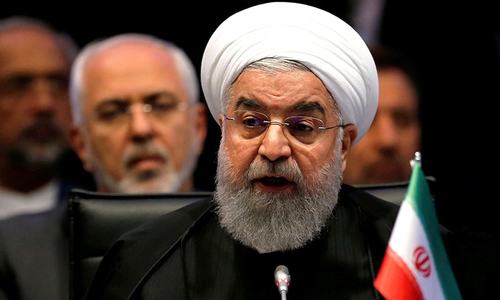Oil prices surged on Monday, with Brent crude posting its biggest intra-day percentage gain since the start of the Gulf War in 1991, after an attack on Saudi Arabian oil facilities on Saturday shut in the equivalent of 5 per cent of global supply.
Benchmark Brent crude futures rose by as much as 19.5pc to $71.95 per barrel, the biggest intra-day jump since Jan. 14, 1991. The front-month contract was at $66.20 per barrel, up $5.98, or 9.9pc, from their previous close, at by 0343 GMT.
US West Texas Intermediate (WTI) futures climbed by as much as 15.5pc to $63.34 a barrel, the biggest intra-day percentage gain since June 22, 1998. The front-month contract was at $59.73 a barrel, up $4.88, or 8.9pc, at 0343 GMT.
Saudi Arabia is the world's biggest oil exporter and the attack on the state-owned producer Saudi Aramco's processing facilities at Abqaiq and Khurais has cut output by 5.7 million barrels per day. The company has not given a timeline for the resumption of full output.
A source close to the matter told Reuters the return to full oil capacity could take "weeks, not days". Saudi Arabia's oil exports will continue as normal this week as the kingdom taps into stocks from its large storage facilities, an industry source briefed on the developments told Reuters on Sunday.
"How the United States and Saudi Arabia deal with the situation will be closely watched," said Margaret Yang, market analyst at CMC Markets in Singapore.
"If higher oil prices are here to stay, Asia's oil reliant economies such as China, Japan, India, South Korea and the Philippines will start to feel the pain as higher energy and raw material prices add on the cost burden," Yang added.
US President Donald Trump said he approved the release of oil from the US Strategic Petroleum Reserve (SPR) if needed in a quantity to be determined due to the attack.
The attack on plants in the heartland of Saudi Arabia's oil industry, including the world's biggest petroleum-processing facility at Abqaiq, came from the direction of Iran, and cruise missiles may have been used, according to a senior US official. Initial reports indicated the attack came from Yemen.
Risk premium
ANZ Research said in a note that the market would price in "a sizable global geopolitical risk premium".
"Any expectation that the market had about the U.S. easing sanctions on Iran following President Trump's dismissal of John Bolton will quickly dissipate. This should see Brent crude test the $70 per barrel mark in the short term," ANZ Research said.
Saudi Arabia is set to become a significant buyer of refined products after the attacks, consultancy Energy Aspects said in a note.
Saudi Aramco will likely buy significant quantities of gasoline, diesel and possibly fuel oil while cutting liquefied petroleum gas exports.
US gasoline futures rose as much 12.9 per cent, while US heating oil futures rose by as much as 10.8pc. China's Shanghai crude oil futures rose to its trading limit, gaining 8pc at the open.
Meanwhile, Saudi Aramco has told one Indian refinery there will be no immediate impact on oil supplies as it will deliver crude from other sources and has adequate inventory, a source with the refinery said.
Other Asian buyers such as Thailand have also said the attack would have no immediate impact on oil imports.














































